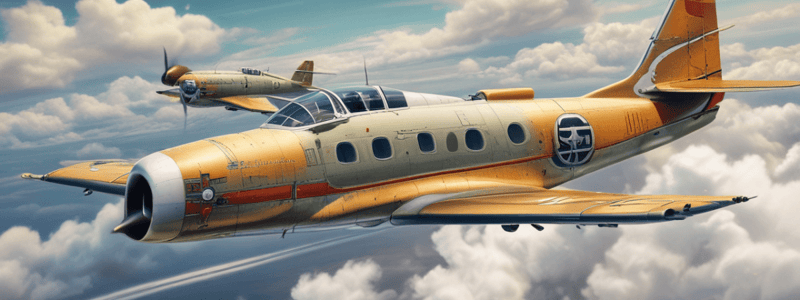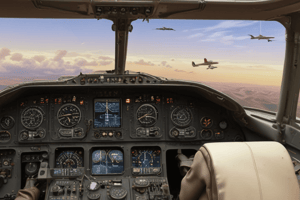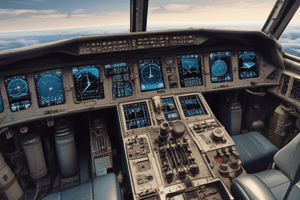Podcast
Questions and Answers
What is the primary advantage of integrating trim systems into the autopilot system?
What is the primary advantage of integrating trim systems into the autopilot system?
- Reduced fuel consumption
- Improved aerodynamic profile
- Enhanced precision and workload reduction (correct)
- Increased aircraft speed
What is a significant benefit of proper trim system utilization?
What is a significant benefit of proper trim system utilization?
- Increased aircraft range
- Improved communication with air traffic control
- Reduced aircraft weight
- Reduced risk of control-induced fatigue (correct)
What is the result of maintaining an optimal aerodynamic profile through proper trim use?
What is the result of maintaining an optimal aerodynamic profile through proper trim use?
- Increased drag and power required
- Increased aircraft stability
- Reduced drag and power required (correct)
- Reduced fuel efficiency
What is the primary role of the trim system in flight stability?
What is the primary role of the trim system in flight stability?
Why is proper trim system utilization crucial for pilots during long-duration flights?
Why is proper trim system utilization crucial for pilots during long-duration flights?
What is a consequence of not using trim systems effectively?
What is a consequence of not using trim systems effectively?
What is the primary benefit of pilots understanding and effectively utilizing trim systems?
What is the primary benefit of pilots understanding and effectively utilizing trim systems?
How does proper trim system use impact aircraft performance?
How does proper trim system use impact aircraft performance?
What is a critical aspect of flight management that pilots can focus on when using trim systems effectively?
What is a critical aspect of flight management that pilots can focus on when using trim systems effectively?
Why is the trim system a fundamental tool for flight stability?
Why is the trim system a fundamental tool for flight stability?
Trim systems can only be used in manual flight mode.
Trim systems can only be used in manual flight mode.
The primary function of trim systems is to reduce the pilot's mental workload.
The primary function of trim systems is to reduce the pilot's mental workload.
Proper trim system use can lead to increased fuel consumption.
Proper trim system use can lead to increased fuel consumption.
Pilots can operate the aircraft safely without proper trim system utilization.
Pilots can operate the aircraft safely without proper trim system utilization.
Trim systems can only be used in high-altitude flights.
Trim systems can only be used in high-altitude flights.
Autopilot systems can make adjustments to the trim without pilot input.
Autopilot systems can make adjustments to the trim without pilot input.
Trim systems are only used in commercial aircraft.
Trim systems are only used in commercial aircraft.
Pilots can completely rely on autopilot systems to maintain flight stability.
Pilots can completely rely on autopilot systems to maintain flight stability.
Trim systems can only be adjusted manually.
Trim systems can only be adjusted manually.
Understanding trim systems is only important for pilots during takeoff and landing.
Understanding trim systems is only important for pilots during takeoff and landing.
What is the primary reason why pilots need to continuously monitor and adjust the controls when not using trim systems?
What is the primary reason why pilots need to continuously monitor and adjust the controls when not using trim systems?
How does the autopilot system utilize trim systems to maintain the desired flight path?
How does the autopilot system utilize trim systems to maintain the desired flight path?
What is the impact of proper trim system utilization on the pilot's workload?
What is the impact of proper trim system utilization on the pilot's workload?
What is the primary benefit of reducing drag through proper trim system use?
What is the primary benefit of reducing drag through proper trim system use?
How does the trim system enhance the pilot's control over the aircraft?
How does the trim system enhance the pilot's control over the aircraft?
What is the primary advantage of using trim systems during long-duration flights?
What is the primary advantage of using trim systems during long-duration flights?
What is the role of the trim system in maintaining flight stability?
What is the role of the trim system in maintaining flight stability?
What is the primary benefit of integrating trim systems with autopilot systems?
What is the primary benefit of integrating trim systems with autopilot systems?
What is the impact of improper trim system utilization on the pilot's ability to operate the aircraft safely?
What is the impact of improper trim system utilization on the pilot's ability to operate the aircraft safely?
What is the primary benefit of using trim systems in conjunction with autopilot systems during long-duration flights?
What is the primary benefit of using trim systems in conjunction with autopilot systems during long-duration flights?
Flashcards are hidden until you start studying
Study Notes
Fundamentals of Flight: Mastering Aircraft Control Systems
Stability and Trim Systems
- Stability is the linchpin of safe flight operations, providing predictability and control for pilots.
- Trim systems allow an aircraft to maintain a consistent attitude without continuous pilot input, promoting equilibrium.
Purpose and Function of Trim Systems
- Trim systems serve as a fine-tuning mechanism, balancing aerodynamic forces acting on the aircraft.
- They reduce pilot fatigue and enhance overall flight safety by offloading constant manual input.
Types of Trim Systems
- Trim systems range from simple trim tabs on small aircraft to sophisticated, computer-integrated systems in jet airliners.
- Three types of trim systems: elevator trim (adjusts horizontal stabilizer, affecting pitch), rudder trim (corrects yaw), and aileron trim (tunes lateral balance).
Practical Application of Trim Systems
- Pilots use trim systems to counteract forces and moments acting upon the aircraft, striving for equilibrium in each flight phase.
- Trim adjustments are indispensable during ascent (upward pitch), level flight (neutral position), and descent (slight nose-down attitude).
- Improper trim can lead to safety issues, such as excessive nose-up trim causing an unexpected stall.
Importance of Trim Systems in Flight
- Trim systems enhance stability and performance, relieving pilots of constant force application to controls.
- They are critical for pilots to understand, as improper trim can lead to safety issues.
- Proper use of trim contributes to fuel efficiency, maintaining an optimal aerodynamic profile, and reducing drag.
Trim Systems in Modern Aircraft
- Trim systems are designed to maintain an aircraft's control surface positions, relieving pilots from constant manual input.
- They work by adjusting aerodynamic balance through small trim tabs on primary control surfaces.
- In advanced aircraft, trim systems are often integrated into autopilot systems, allowing for greater precision and workload reduction.
Trim System in Aircraft Control
- The trim system is a critical component in achieving stable flight by allowing an aircraft to maintain a consistent attitude without continuous pilot input.
- Trim systems serve as a fine-tuning mechanism, helping to balance the aerodynamic forces acting on the aircraft, promoting equilibrium.
Purpose of Trim Systems
- Trim systems enable pilots to offload constant manual input, reducing pilot fatigue and enhancing overall flight safety.
- The primary purpose of trim systems is to help the aircraft maintain a specific attitude or flight condition without constant manual input from the pilot.
Types of Trim Systems
- Elevator trim adjusts the longitudinal stability of the aircraft.
- Rudder trim manages yaw.
- Aileron trim manages roll.
Importance of Trim Systems
- Trim systems are essential for maintaining stable flight conditions, which are crucial for safety and efficiency in flight operations.
- Proper use of trim can contribute to fuel efficiency, as it helps maintain an optimal aerodynamic profile, reducing drag and the power required to sustain flight.
Pilot-Trim Interaction
- Pilots adjust the trim in response to changes in the aircraft's flight configuration or in reaction to natural shifts in the center of gravity as fuel is consumed.
- The dynamic interaction between pilot and trim is quintessential in maintaining stability without overworking the pilot or the control surfaces.
Safety Considerations
- Incorrect usage of trim systems, such as setting an inappropriate trim for the phase of flight, can lead to instability, posing a significant safety risk.
- Improper trim could lead to safety issues, such as excessive nose-up trim leading to an unexpected stall, or inadequate trim during takeoff affecting the aircraft's climb capability.
Maintenance and Checks
- Regular maintenance and checks on trim systems are crucial to ensure the smooth operation and safety of an aircraft.
- A well-maintained trim system is essential for the safety and efficiency of flight operations.
Autopilot and Manual Flights
- Pilots must maintain proficiency in manual trim adjustments to ensure they can confidently handle scenarios when autopilot isn't an option.
- Autopilot usually manages trim automatically, further reducing the pilot's workload.
Practical Application
- Understanding and effectively utilizing trim systems is vital for pilots as it leads to more comfortable flights, reduces the risk of control-induced fatigue, and allows pilots to focus on other critical aspects of flight management.
- Trim systems are a fundamental tool for flight stability that, when used correctly, significantly enhances the pilot's control over the aircraft while reducing the physical and mental workload.
Trim System in Aircraft Control
- The trim system is a critical component in achieving stable flight by allowing an aircraft to maintain a consistent attitude without continuous pilot input.
- Trim systems serve as a fine-tuning mechanism, helping to balance the aerodynamic forces acting on the aircraft, promoting equilibrium.
Purpose of Trim Systems
- Trim systems enable pilots to offload constant manual input, reducing pilot fatigue and enhancing overall flight safety.
- The primary purpose of trim systems is to help the aircraft maintain a specific attitude or flight condition without constant manual input from the pilot.
Types of Trim Systems
- Elevator trim adjusts the longitudinal stability of the aircraft.
- Rudder trim manages yaw.
- Aileron trim manages roll.
Importance of Trim Systems
- Trim systems are essential for maintaining stable flight conditions, which are crucial for safety and efficiency in flight operations.
- Proper use of trim can contribute to fuel efficiency, as it helps maintain an optimal aerodynamic profile, reducing drag and the power required to sustain flight.
Pilot-Trim Interaction
- Pilots adjust the trim in response to changes in the aircraft's flight configuration or in reaction to natural shifts in the center of gravity as fuel is consumed.
- The dynamic interaction between pilot and trim is quintessential in maintaining stability without overworking the pilot or the control surfaces.
Safety Considerations
- Incorrect usage of trim systems, such as setting an inappropriate trim for the phase of flight, can lead to instability, posing a significant safety risk.
- Improper trim could lead to safety issues, such as excessive nose-up trim leading to an unexpected stall, or inadequate trim during takeoff affecting the aircraft's climb capability.
Maintenance and Checks
- Regular maintenance and checks on trim systems are crucial to ensure the smooth operation and safety of an aircraft.
- A well-maintained trim system is essential for the safety and efficiency of flight operations.
Autopilot and Manual Flights
- Pilots must maintain proficiency in manual trim adjustments to ensure they can confidently handle scenarios when autopilot isn't an option.
- Autopilot usually manages trim automatically, further reducing the pilot's workload.
Practical Application
- Understanding and effectively utilizing trim systems is vital for pilots as it leads to more comfortable flights, reduces the risk of control-induced fatigue, and allows pilots to focus on other critical aspects of flight management.
- Trim systems are a fundamental tool for flight stability that, when used correctly, significantly enhances the pilot's control over the aircraft while reducing the physical and mental workload.
Studying That Suits You
Use AI to generate personalized quizzes and flashcards to suit your learning preferences.




